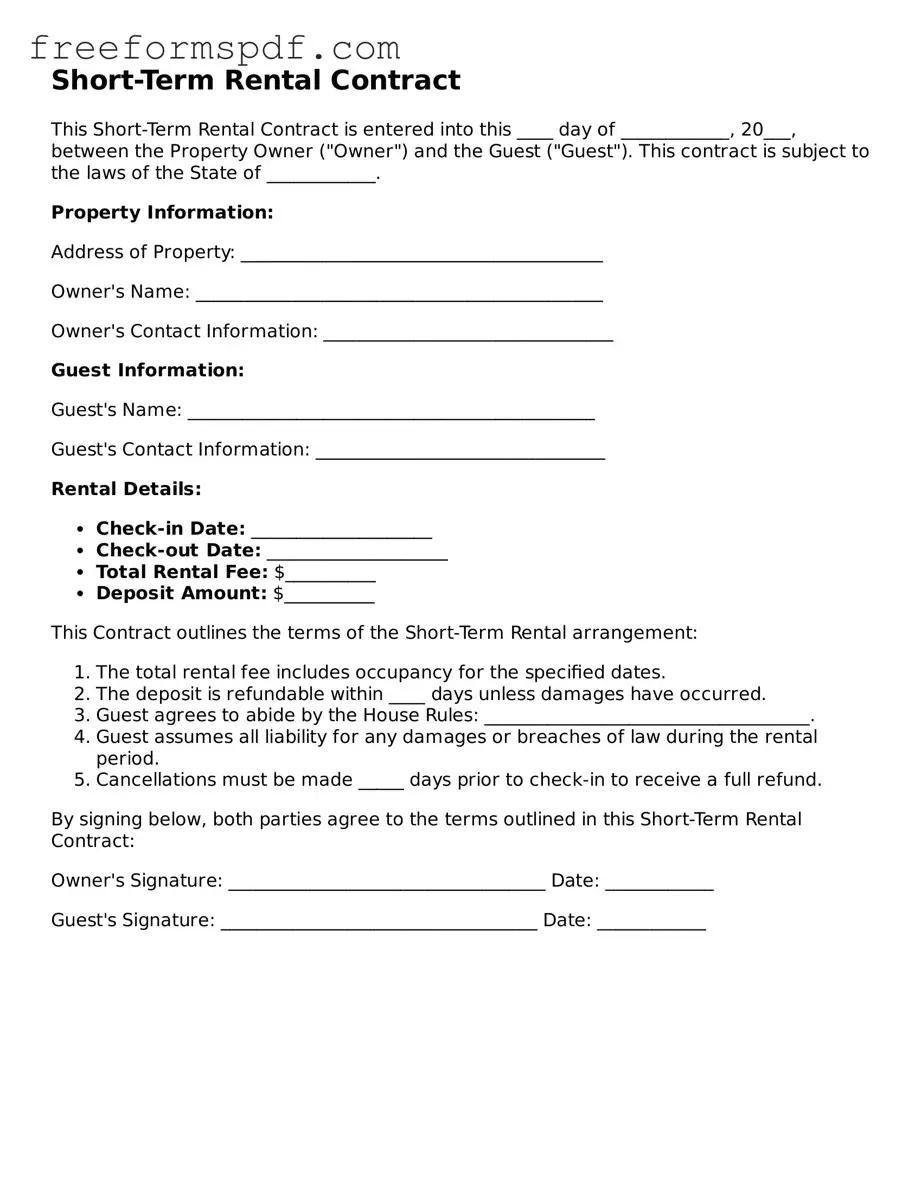Short-Term Rental Contract Document
Common mistakes
-
Incomplete Information: Many individuals forget to fill out all required fields. Missing names, addresses, or contact details can lead to confusion later.
-
Ignoring Terms and Conditions: Some people skim through the terms and conditions without fully understanding them. This can result in misunderstandings about cancellation policies or security deposits.
-
Not Providing Accurate Dates: It’s crucial to double-check the rental dates. Incorrect dates can lead to booking conflicts or financial losses.
-
Overlooking Signature Requirements: Failing to sign the contract or not having all parties sign can render the agreement invalid. Ensure every necessary signature is in place before submission.
Learn More on This Form
-
What is a Short-Term Rental Contract?
A Short-Term Rental Contract is a legal agreement between a property owner and a guest. It outlines the terms and conditions for renting a property for a short period, typically less than 30 days. This contract protects both parties by clearly stating their rights and responsibilities during the rental period.
-
What key information should be included in the contract?
The contract should include the following key details:
- Names and contact information of both the property owner and the guest.
- Property address and description.
- Rental dates and check-in/check-out times.
- Total rental price and payment terms.
- Security deposit information, if applicable.
- Cancellation policy.
- Rules and regulations for the property.
-
Why is a Short-Term Rental Contract important?
This contract is crucial for several reasons. First, it helps prevent misunderstandings between the property owner and the guest. By having a written agreement, both parties can refer back to the contract if any issues arise. Additionally, it provides legal protection in case of disputes, ensuring that both parties adhere to the agreed-upon terms.
-
What happens if a guest violates the terms of the contract?
If a guest violates the terms of the contract, the property owner has the right to take appropriate action. This may include retaining the security deposit, charging additional fees, or even terminating the rental agreement. It is important for the property owner to document any violations and communicate clearly with the guest about the consequences.
-
Can the contract be modified after it has been signed?
Yes, the contract can be modified, but both parties must agree to the changes. Any modifications should be documented in writing and signed by both the property owner and the guest. This ensures that all parties are aware of and agree to the new terms.
-
What should I do if I have questions about the contract?
If you have questions about the Short-Term Rental Contract, it is advisable to seek clarification from the property owner or a legal professional. Understanding the terms and conditions is essential to ensure a smooth rental experience for both parties.
Misconceptions
Understanding the Short-Term Rental Contract form is essential for both hosts and guests. However, several misconceptions can lead to confusion. Here are eight common misunderstandings:
-
It’s only for vacation rentals.
Many people think this contract is only applicable to vacation homes. In reality, it can cover any type of short-term rental, including apartments and shared spaces.
-
It’s not legally binding.
Some believe that a rental contract is just a formality. However, once both parties sign it, the contract becomes legally binding and enforceable.
-
All rental agreements are the same.
This is a common misconception. Each rental agreement can be customized to fit the specific needs of the host and guest, including terms like payment schedules and house rules.
-
Verbal agreements are sufficient.
While a verbal agreement might seem convenient, it can lead to misunderstandings. A written contract provides clarity and protection for both parties.
-
Security deposits are optional.
Many assume that security deposits are not necessary. However, they are often included in contracts to protect against damages or unpaid fees.
-
Cancellation policies are the same everywhere.
Each rental agreement can have different cancellation policies. It’s important to read the contract carefully to understand the terms regarding cancellations.
-
Only the host needs to sign.
Some people think only the host’s signature is required. In fact, both the host and the guest must sign the contract for it to be valid.
-
It covers all potential issues.
While the contract addresses many important topics, it may not cover every possible scenario. Both parties should discuss and agree on any additional concerns before finalizing the contract.
Being aware of these misconceptions can help ensure a smoother rental experience for everyone involved.
Other Types of Short-Term Rental Contract Forms:
Non Renewal Tenant Sample Letter to Landlord Not Renewing Lease - Document used to clarify that the lease agreement will not continue beyond its term.
How to Apply for Rent - Include the name of your previous landlord for reference.
Before signing any rental contract, it is essential to review the Arizona Lease Agreement form, as it clearly defines the responsibilities of both the landlord and tenant, ensuring an understanding that can significantly reduce misunderstandings. For those looking to obtain this document, resources such as Arizona PDF Forms provide convenient access to the necessary forms and guidelines.
Parking Rental Agreement - It can clarify who is responsible for damages to the space.
